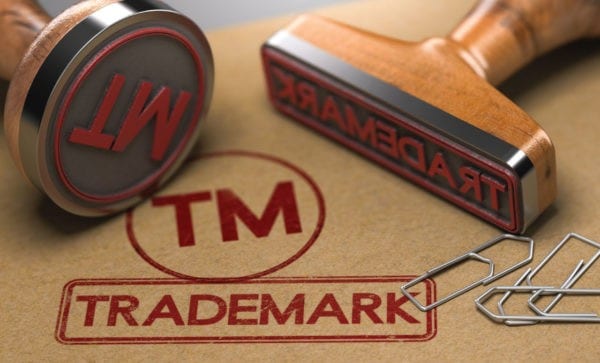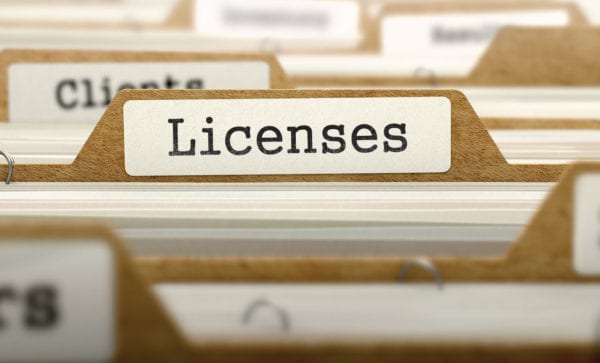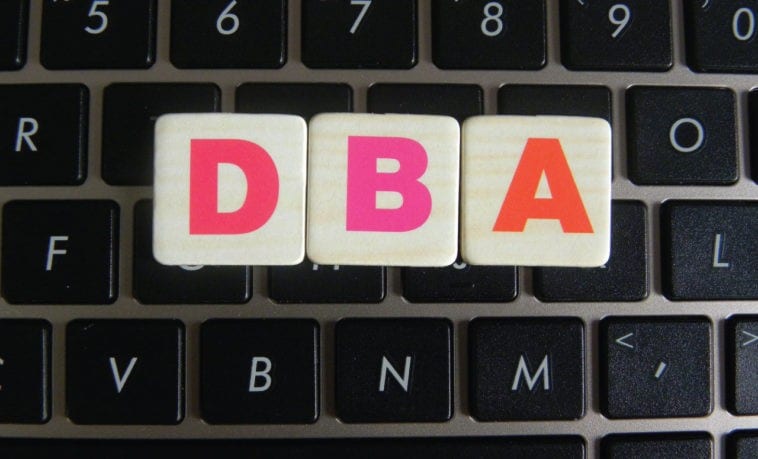Adding a DBA to an LLC can open up your business opportunities by allowing your company to conduct business under a different name. The process of adding a DBA, though, can be full of potential pitfalls.
Before acting, small business owners who are considering filing a DBA name need to fully understand what it means to register additional business names as DBAs and what benefits this business move offers.
If you’re wondering how to add a DBA to an LLC, it makes sense to start with the basics.
- An LLC, or limited liability company, is a business structure that designates a company as a legally separate entity from its owner or owners.
- A DBA, or “doing business as” name, is a name other than your legal LLC name that your company uses in business. Other common terms for a DBA are “fictitious business name” and “assumed business name.”

To use a DBA legally, you have to go through a formal process to file a DBA with the government. Otherwise, you could face the consequences of conducting unauthorized business transactions, despite having a business license under your official LLC name.
What Is a Fictitious Business Name?
The term “fictitious business name” isn’t quite what it sounds like. Although your fictitious name is not the legal name you chose when you first decided to form an LLC, using it isn’t a fiction.
You’re not trying to fool or trick anyone by using a DBA. Companies use a fictitious business name all the time, for several legitimate reasons, and doing so is perfectly legal—assuming, of course, that you go through the proper process of DBA registration.
Other Terms for a DBA

Much like LLCs that go by a DBA name, the concept of using a business name other than the one under which your business was legally registered can also go by other names. Different states use different language to refer, formally or informally, to a DBA name. Depending on where your company operates, you might come across the following terms that are generally equivalent to DBA:
- Assumed name
- Fictitious name
- Trade name
- Trading as name
Reasons to Use a DBA
Before you dive into the process used to add a DBA to your LLC, you need to be sure that DBA filing is really the right choice for your business. What are you trying to accomplish by using a different name for your company, and is a DBA the best way to go about it?
For an LLC, the main reasons why you might decide to add a DBA to your business are:
- Launching spinoff businesses
- Expanding into other states
- Using a different, catchier, or more descriptive name for marketing your company
If you have another reason in mind for using an assumed name, you should think through what you’re hoping to gain and whether filing a DBA is the right process for achieving that goal. If you file a DBA for the wrong reasons, you could be spending your money, time, and effort on an endeavor that won’t achieve the goal you want.
Using DBAs to Launch Multiple Businesses
Perhaps you formed your LLC under one business name, and it really took off. In fact, you may have achieved so much success that you’re now planning to leverage your initial business to grow some offshoots of your company. Although you may choose to keep all of your business activities under your original LLC name, it doesn’t always make sense to do so.
If you’re opening new locations but your LLC’s legal name contains a geographical modifier, like a city name or street name, there’s a good chance you will want to file a DBA for this new location. After all, opening a second location of Main Street Dry Cleaning on Oak Street, instead of Main Street, might just confuse people.
When your new business venture is significantly different from the purpose of your original business, a DBA name can help you clarify and differentiate this new area of business from your existing LLC’s business activities. For example, if you decide to launch a food truck that takes a sampling of your restaurant’s signature menu options to festivals and events, you might want to tweak your business name for this specific endeavor to highlight its mobile, on-the-go nature.
Similarly, if your LLC started out as an art gallery but now offers a full course of art lessons, a DBA name that incorporates “art school” or “academy” could better encompass everything your business does now.
This isn’t to say that you should use one LLC to cover a bunch of unrelated businesses. However, when one business naturally grows out in different directions, in terms of business activities or geography, the strategic use of DBA names can help you and your customers make sense of all you have to offer.
Registering a DBA to Conduct Business in Other States

If your LLC isn’t only expanding across its home state but also across state lines, you may have another reason to register a DBA. When you choose an LLC name, you reserve and register that name only in the state in which you’re forming your LLC. In another state, a totally unrelated company could already be using the same business name.
Some states require that companies formed in other states (sometimes called “foreign” entities even if they were formed on American soil) use a different name to conduct business if a domestic company (formed within that state) already uses the same or a similar name.
If you find out that another entity in the state you’re trying to expand to is already using the name of your LLC, a DBA name may be the only way you can move forward. Business names aren’t always as unique as you might think, especially if your LLC name simply combines a common first name, last name, or geographic location with your industry or area of business activities.
Using a More Descriptive Name for Marketing Purposes

One of the other reasons that business owners sometimes decide to add a DBA is so they can market the company under a catchier name that better describes the purpose of the business. If your name doesn’t mean anything to your customers and clients, you may have a hard time drumming up enough business to keep your company going strong.
Why LLCs May Not Have to Worry About a Catchy Name for a DBA
The need for a catchier name is less likely to apply to LLCs than another type of business structure common among small business entities: sole proprietorships.
Unlike LLCs, small businesses established as sole proprietorships aren’t established as legally separate entities, so they may not have a business name that’s distinct from the owner’s legal name.
In some states, a business owner who operates as a sole proprietor is only allowed to conduct business under their personal name unless they register a DBA. Since their personal name doesn’t describe the nature of their work, the sole proprietor would likely need to use a DBA to construct a separate business name that encapsulates what their company actually does.
As an example, suppose an aspiring small business owner named John Doe decides to go into business as a sole proprietor. Under his own name, he could go into business providing whatever service he is authorized to provide—dentistry, personal training, or catering, for example.
However, depending on the state in which he works, he might not be allowed to conduct business as “John Doe’s Center for Dentistry,” “Muscle Builder Personal Training,” or “John’s Party Platters” without filing a DBA name registration.
LLCs don’t have to worry about that because name reservation or registration is a part of the process required to form an LLC. Regardless of whether you’re the only owner in a single-member LLC or one of several owners establishing a multi-member LLC, you have to choose a name to form an LLC in the first place. This means that, as an LLC owner, you have an initial opportunity to pick a name that matches your business purpose and activities.
Similarly, a sole proprietor may need a DBA to open a business bank account that’s separate from their personal financial accounts, but that’s not the case for LLCs, since even single-member LLCs have a distinct name and legal identity.
When LLCs Need a DBA That Better Describes Their Company
Suppose that the name you chose when you formed your LLC was a personal nickname or a blend of the business owners’ personal names. Like the full legal name of a sole proprietor, this name may be your LLC’s registered legal name, but it may not match your business activities. Giving your business an alter ego that really captures what your LLC does may make marketing, advertising, and building your brand easier.
You might also choose to file a DBA for your LLC if you have rebranding on your mind, even if your original LLC name did—and still does—describe what your business does. Whether because something fundamental in your business philosophy has changed or because you’re simply eyeing a fresh new image, rebranding can transform how your customers see your business.
Rebranding doesn’t always require adding a DBA, but the two can go hand in hand.
What a DBA Doesn’t Do
When you add DBA names, you’re not changing your LLC’s legal name, just allowing yourself to also use a different business name. Registering a DBA name that cuts out one member’s name from the business doesn’t actually change the ownership of the company.
The process of filing a DBA also doesn’t give your company exclusive rights to use that fictitious name.
The Dangers and Downsides of Using DBAs for Your LLC

There are a lot of possible advantages to using a trade name, but a DBA filing isn’t without its downsides. As with just about every business decision, deciding whether adding a DBA to an LLC is the right business move for your company requires you to really think about what outcome you want.
Below are some of the downsides of using a fictitious name for a limited liability company and how to manage the risks.
- Registering a DBA doesn’t constitute a name change.
- Adding a DBA doesn’t change your company’s ownership.
- A DBA isn’t trademarked automatically.
- Multiple businesses launched under DBAs aren’t protected.
- A DBA filing is an additional cost for your business.
Don’t let this list of drawbacks scare you away from adding a DBA to your LLC, but do keep in mind the pros and the cons when deciding how to proceed. Whether or not it’s a good idea for an LLC to register a DBA name depends on individual factors like what the business owners want to accomplish.
A DBA Is Not a Name Change
When you add a DBA, you’re not changing your LLC’s name to that fictitious name. Your company’s original name stays the same. By registering a trade name, you’re only positioning your company to also conduct business under that additional name.
A DBA doesn’t serve the purpose of cutting ties with your original LLC name. For that, you would need to file an amendment to your articles of organization or articles of formation, the document you originally filed with your secretary of state to create the LLC in the first place.
The complex process of changing your LLC’s legal name may require the company’s owners to:
- Vote to accept a name change resolution.
- Update the company’s operating agreement.
- Amend the articles of organization with the state.
- Update all business licenses and registrations.
This process generally takes more time and effort than merely registering a DBA and may cause you to incur more fees to do so. That’s why LLC owners should consider what’s most important to them: being able to use a new business name or getting rid of their LLC’s old name.
A Fictitious Name Doesn’t Alter an LLC’s Ownership
Just as the DBA doesn’t change the company’s official name, it also doesn’t have the power to change who is an owner of the company. If one owner wants to leave the LLC—or if the other owners want that member out of the company—it takes more than filing a new DBA that cuts out that owner’s name to do so.
Aside from going through the sometimes messy process of voting out or buying out a member of your LLC, you would need to file the appropriate paperwork with the secretary of state. In some instances, you can remove a member from an LLC by filing an amendment to your articles of organization, but in other instances, you may need to first dissolve the LLC and then form a new limited liability company.
A DBA Isn’t the Same as a Trademark

Some business owners make the mistake of thinking that just because they have the right to use a fictitious name, no one else can use that name. A DBA filing isn’t the same as a trademark that grants your limited liability company exclusive rights to use a trading name. If you want to protect your fictitious name as your company’s intellectual property, you have to go through the process of registering a trademark.
You can trademark your LLC’s legal name, its DBA name, or both. You could also choose not to trademark any business name for your company. However, trademarking a DBA name may be the only way you can make sure no one else will do business under the fictitious name you have chosen.
A DBA Doesn’t Protect Individual Business Endeavors

If you decide to use DBAs to launch different offshoots of your business, you should know that it’s not the same as establishing individual LLCs to protect each different business entity. That is, if you used a DBA for the food truck associated with your restaurant and that food truck endeavor failed, any debts or lawsuits filed against your company using a DBA would become the problem of your main company.
If you’re looking for liability protection not only between yourself and the business but also between different business ventures, you might be better off establishing a series LLC. In a series LLC, each business offshoot is a child LLC under one parent limited liability company.
Generally, establishing separate business entities for each of your business endeavors, either as separate cells within a series LLC or as completely independent LLCs formed separately, gives each of your companies protection from the others’ financial liabilities.
All business you conduct under a DBA is still part of one LLC, while the business you conduct under different cells within a series LLC is separate from that of other cells. The practical difference between using DBAs to launch multiple business ventures and using a series LLC to do so is what would happen in the event of a creditor seeking to collect debts or a plaintiff filing a lawsuit against one of your businesses.
- If you use DBAs to differentiate between your businesses for branding purposes, all of your business ventures are still legally one business entity. Debts or judgments against any part of your company can take assets from other aspects of the company.
- If you formed a series LLC instead and set up each business venture as its own cell, a creditor or plaintiff wouldn’t be entitled to the financial assets of other companies that are established as legally separate businesses.
That said, the LLC business structure still provides you with liability protection in terms of your personal financial assets, and adding a DBA name doesn’t change that.
Registering a DBA Is Another Business Expense

Everyone loves a story about a business owner who starts with nothing and makes it to the top, but the reality is that starting and maintaining even a small business does cost money. DBA filing fees usually aren’t enough to derail your operating budget, with many states charging just $5 to $30. However, if you’re planning to register numerous DBAs or register your fictitious name in many different counties or states, these costs can add up.
Your alternate business name may need to be renewed periodically, so the cost to file a DBA isn’t a one-time expense. You should factor the filing fees required to renew each of your DBA names into the ongoing costs of an LLC. You could also end up spending more money if you need to update professional licenses and business licenses or if you decide to trademark your new business name.
Of course, having professional materials like business cards, company letterhead, brochures, flyers, and more printed with a new company name can also add to your operating expenses.
What If You Add a DBA Only to Find Out You Didn’t Need One?
If you do register a DBA only to later realize that it wasn’t necessary, the good news is that the damage done by adding a fictitious name is minimal.
You’re not required to use or keep using the assumed name if you don’t want to. By filing a DBA you didn’t really need, you have only wasted the time, the comparably small fee to register a DBA, and the hassle of going through the DBA registration process.
The bigger concern is that, if you thought adding a DBA to an LLC would protect your company in ways that it does not, you could end up facing consequences like ownership disputes, others using your trade name, or financial liabilities.
Do You Need to Register a DBA?
Yes! If you plan to do business under a fictitious name, then you absolutely need to investigate the rules, regulations, and process of registering a DBA in the appropriate state.
Not all states have a formal DBA registration process or requirement, but most do, according to the U.S. Small Business Administration. It’s best that you assume you need to register a DBA before you start using it unless information from your secretary of state, county clerk’s office, legal counsel, or other authority says otherwise.
If it turns out that you don’t need to register a DBA with the state or county where you are doing business, then at least you have the peace of mind of knowing that you’ve done your due diligence and won’t face any penalties for not following the proper procedures.
The consequences of failing to register a DBA when using a different name to do business are serious. You could face thousands of dollars in fines, be prohibited from doing any further business, or even face criminal charges and jail time for illegally conducting business under a fictitious name that isn’t properly registered.
Things to Know Before You File a DBA

Here are a couple of things LLC owners should keep in mind before starting a DBA registration form.
Think Back to the Process of Starting Your LLC
The process of filing a fictitious business name with your county or state is nowhere near as complex or labor-intensive as forming a brand-new LLC. A lot of the work you did to create your LLC, such as filing your articles of organization, crafting an operating agreement, and hiring a registered agent, will continue to serve your LLC under its new DBA name.
However, the process of filing a fictitious name registration does mimic one aspect of LLC formation: choosing the name of your LLC. Just as you did when you first started your LLC, you’re going to undertake the informal procedures of brainstorming new business name ideas. Once you have some ideas, you will need to conduct a name search using a database much like the one you used to finalize your LLC’s legal name in the first place.
If a lot of time has passed between your LLC formation and adding your DBA name, don’t worry. The process of registering a DBA name is fairly straightforward, even if you don’t have the benefit of having recently gone through the process of starting an LLC.
Timing Matters

When you decide to start using a fictitious business name matters. Once you begin considering adding a DBA to an LLC, you should look into the laws in the appropriate state or states in which you plan on doing business. The timing and requirements for filing a DBA name vary by state.
In certain states, you can’t register a DBA until after you have begun using it. For example, the Application to Register or Renew Trademark, Service Mark, or Trade Name in Alabama not only asks applicants to provide the date the fictitious name was first used but also requires them to submit three “specimens displaying the mark in use.”
On the other hand, you can’t legally begin using an assumed name in other states until after you register a DBA. Mistaking the order in which you should undertake DBA registration and trade name usage could leave you facing serious consequences. Many states will levy a heavy fine against companies for conducting business in unauthorized ways, including using a DBA name that isn’t already registered. Virginia, for example, for example, may fine companies up to $2,500 if they’re caught using a fictitious business name that hasn’t been properly registered as a DBA name.
In some instances, a misstep in using a DBA before you register it can lead to criminal charges, as well as a fine. In California, an individual can be charged with a misdemeanor for conducting unauthorized business on behalf of a company formed elsewhere and not legally registered to do business in the state.
How to File a DBA
Registering a fictitious business name is easy in some ways and difficult in others. The process is generally straightforward, requiring you to come up with a name and fill out a form. However, because different areas handle fictitious business name filings in different ways, you may need to do some research to find out whether you have to register your DBA at the state or county level.
Step 1: Choose Your DBA Name

Before you can file a DBA, you need to decide what name it is that you would like to use for doing business. Some business owners decide to add a DBA to an LLC because they fell in love with a different name, while others start the process for practical reasons, long before any real name inspiration strikes.
There’s no one way to go about choosing a fictitious business name, because what makes a DBA name the right fit is subjective and depends on what you want out of an assumed name. However, some of the factors you might want to consider when deciding on a DBA name include:
- A name’s relevance to your business activities, services, products, or industry.
- Whether a name includes the keywords that will make it easy to find online.
- How the new name relates to your LLC’s legal name, if you’re using it to designate an offshoot of your main business.
Some small business owners benefit from playing around with a free online business name generator. Others prefer brainstorming the old-fashioned way, scribbling down lists, charts, or diagrams to keep track of their ideas. Of course, if you’re part of a multi-member LLC, you will likely have other opinions to contend with besides your own.
Although you want to make sure you’re not rushing into choosing a DBA name without giving it enough thought, it’s also not as high-pressure a decision as you might think. LLCs can always add another DBA to an LLC if you later come up with another new business name you love.
Once you’ve settled on a fictitious name—or, at least, a few final contenders—you can take the next step and conduct a name search. In most states and counties, you’re not allowed to file a DBA registration for a name that is already reserved by another company. A name search with the appropriate state agency can tell you whether the DBA you want is available or whether you need to go back to the drawing board.
Step 2: Register Your DBA Filing Paperwork With the Appropriate Agency

Once you’ve chosen a DBA name and determined that this name is up for grabs, you need to file your DBA name registration to make your use of the name official (and legal). Depending on the state, you may need to file your DBA registration with a state agency, like the secretary of state, or with your county clerk’s office.
Once you find out what office or agency your company needs to work with to start using your new LLC name, the registration process is typically simple. In most cases, you can file a fictitious name registration form online.
There is usually a fee to register a DBA name. In many states, you can file your DBA registration form for $30 or less. Several states charge $50 to register a different name for your business, and others may charge as much as $100.
Step 3: Make Any Licensing Changes Required for Your DBA

When you first decided to form an LLC, you should have gotten whatever business licenses are required at the municipal, county, state, and federal level for you to legally operate your company. Now that you’re operating under a DBA, you may need to update those licenses to reflect both your old and new business names or secure new licenses altogether that apply to your DBA name.
Updating the names on professional licenses often requires you to pay a fee. Depending on the number of licenses that apply to your business and how much it costs to secure or amend those licenses, this requirement could be a big expense for some businesses but no expense for others.
Step 4: Publish Notice of Adding a DBA in a Newspaper

Several state agencies and county clerk’s offices have an unusual requirement for completing the process of registering a business name: publication. For your DBA registration to become official, you may have to run an advertisement that gives notice of your DBA name in a local newspaper or publication.
To make sure that companies comply with this requirement, the state agency or county clerk’s office with which you registered your DBA name may require you to submit a clipping of the notice published in the local newspaper.
Step 5: Trademark Your Fictitious Name

Keep in mind that filing a DBA with the county or state doesn’t give you exclusive rights to that name. You’re legally allowed to use it, but someone else can use it, too—unless, of course, you trademark that name. While you’re not legally required to trademark your DBA name, doing so is a good way to protect your company’s intellectual property and make sure no one else can do business under the name you’re using.
The legal process of trademarking a fictitious business name is overseen by the United States Patent and Trademark Office (USPTO). Although you can undertake this process yourself, the USPTO strongly encourages trademark applicants to hire a professional—an attorney—to represent and assist you in this endeavor.
The bad news is that hiring a legal representative will raise the price of trademarking your DBA name well beyond the few hundred dollars you’re likely to spend in trademark filing fees. However, the good news is that paying a lawyer to handle this process, which can be frustrating and tedious, means you won’t have to spend the time and effort doing this yourself.
Step 6: Put Your DBA Name to Good Use

Once you have officially registered a new name for your LLC with your county or state, it’s time to start using your DBA. Now you can legally use your new name to enter into business contracts, create marketing materials, update or start a new business bank account or credit card account, and more.
Make sure you keep documentation of your DBA name registration in a safe place with your business documents, and keep in mind that you will need to renew that DBA to keep using it once the current registration period is over.
Conclusion
Registering a DBA name is one of the easiest ways for LLC owners to plan for growth or give their brand’s image a fresh makeover. Although the official process can be as simple as submitting a form to your county or state agency, there are a lot of things for small business owners to keep in mind before, during, and after they file this paperwork.
Now that you know the reasons and the steps of DBA registration, you can begin the process of using your new LLC name with confidence.
LLC Resources
How to Start an LLC in California
How to Start an LLC in Florida
How to Start an LLC in Texas
How to Start an LLC in New York

